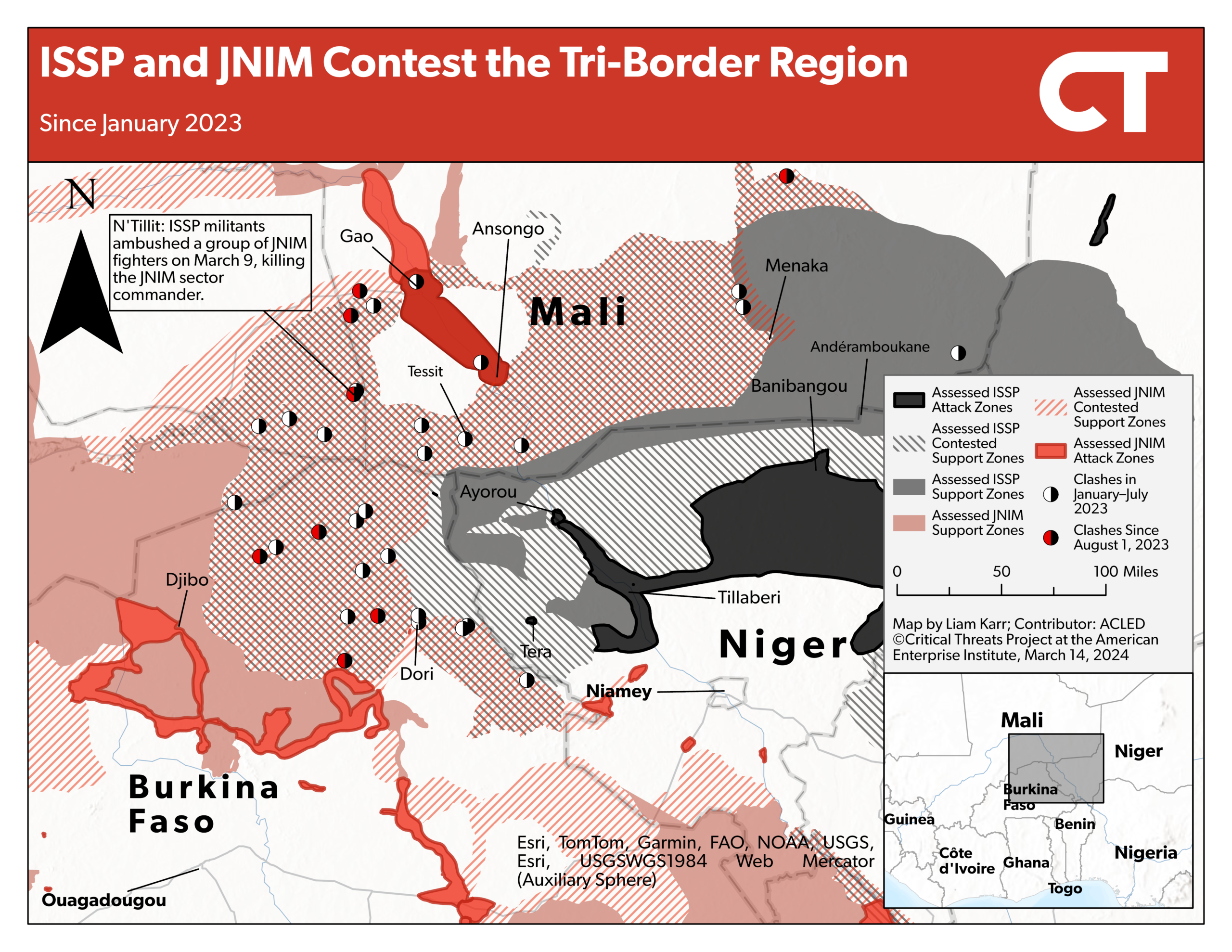Key Takeaways:
- Sahel. The Islamic State’s Sahel Province (ISSP) has established itself as a hub for foreign fighters, raising its transnational threat risk to Northwest Africa and Europe. ISSP and al Qaeda’s Sahelian affiliate have both taken advantage of an informal détente to improve their positions in the Burkinabe, Malian, and Nigerien border region. However, recent clashes indicate that sustained fighting between the groups may resume, which would draw resources away from their campaigns in adjacent areas and toward each other.
- Somalia. Somalia’s inability to maintain its security forces is undermining its ability to contest al Shabaab across the country. Somali troops unexpectedly withdrew from recently liberated areas of central Somalia, allowing al Shabaab to retake key towns. This development threatens Somali control of Harardhere, a district capital and one of the major gains of the central Somalia offensive that began in 2022. Meanwhile, the United Arab Emirates (UAE) is considering cutting training and funding programs for Somali forces, undermining security in Mogadishu and the Somali Federal Government’s (SFG) plan to eventually assume control for its own security.
Assessments:
Sahel
ISSP has expanded its areas of control and established itself as a hub for foreign fighters from North Africa and Europe since early 2023, which increases the group’s transnational threat risk. ISSP began resurging in the tri-border area of Burkina Faso, Mali, and Niger after the withdrawal of French forces in 2021. The UN observed that the territory under ISSP control doubled between 2022 and the first half of 2023, including swaths of northeastern Mali that its al Qaeda–linked rivals and communal militias previously controlled.[1]
An informal détente with al Qaeda’s Sahelian affiliate, Jama’at Nusrat al Islam wa al Muslimeen (JNIM), since July 2023 has enabled ISSP to consolidate control over these areas. The rate and severity of clashes between JNIM and ISSP had significantly decreased in the tri-border region of Burkina Faso, Mali, and Niger after July 2023. This trend was most evident in northeastern Mali, where the two groups fought several large-scale battles between August 2022 and July 2023.[2] Both groups lost hundreds of fighters and used sophisticated systems such as vehicle-borne improvised explosive devices and in-battle drone reconnaissance.[3]
The rate of engagement in this area has significantly fallen since the beginning of August 2023.[4] The severity of these clashes has significantly decreased over the same period, with only one recorded fatality in northeastern Mali since August, compared to 95 in the first seven months of 2023.[5]
Figure 1. Inter-Jihadi Clashes in Northeastern Mali, 2023–24
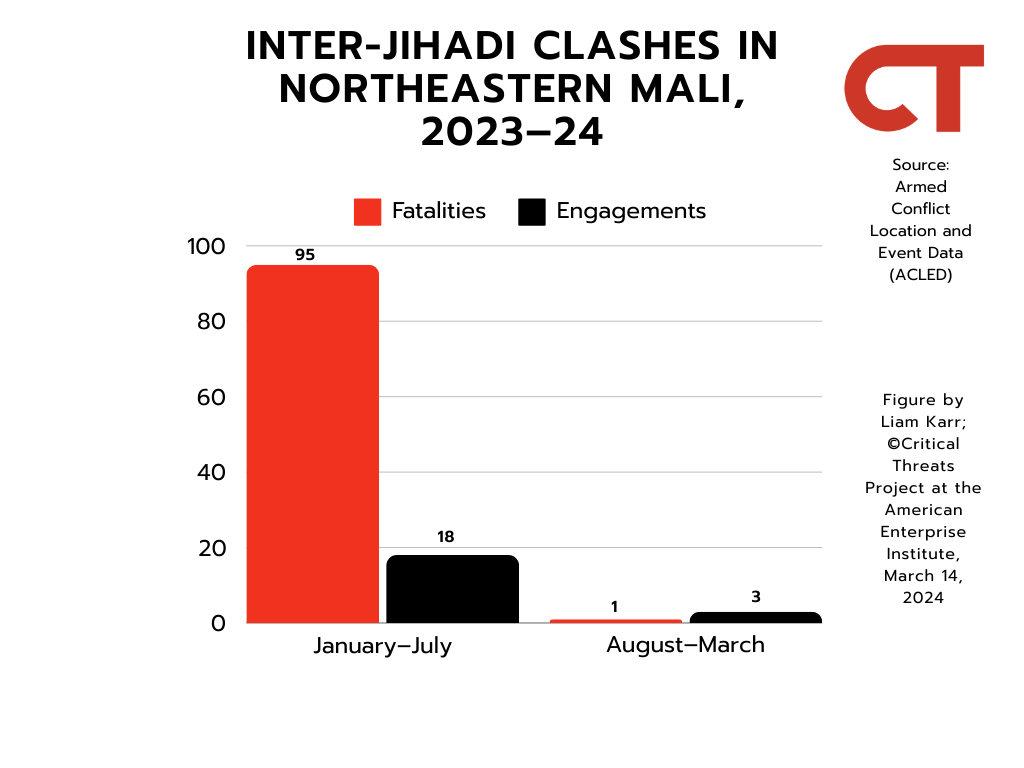
Source: Liam Karr; Armed Conflict Location and Event Database.
ISSP began increasing political and governance efforts during the spring of 2023, implementing various economic, health, infrastructure, judicial, and security initiatives.[6] These policies included regulating water tower usage, reopening weekly markets, financing health services, and providing security patrols around towns and for traders traveling to nearby markets.[7] ISSP also carried out Shari’a punishments at least five times in the Gao and Menaka regions between June and November 2023.[8] The group has also besieged Mali’s easternmost regional capital, Menaka town, causing a humanitarian crisis as the town grapples with inflation and refugees that fled ISSP’s violence.[9]
The détente with JNIM also likely enabled ISSP to increase its activity across the Malian border into Niger after the July 2023 Nigerian coup.[10] The group killed more than twice the number of Nigerien soldiers and civilians during the last five months of 2023 than it did in the first seven months before the coup.[11] This included a large-scale ambush that killed dozens of Nigerien troops in October.[12] The Armed Conflict Location and Event Data project and local reports on X (Twitter) noted that ISSP expanded the rate and geographic scope of its zakat collection activities, which is an obligatory religious tax in Islamic law that Salafi-jihadi groups use to mask forcible extortion.[13]
Figure 2. ISSP Area of Operations
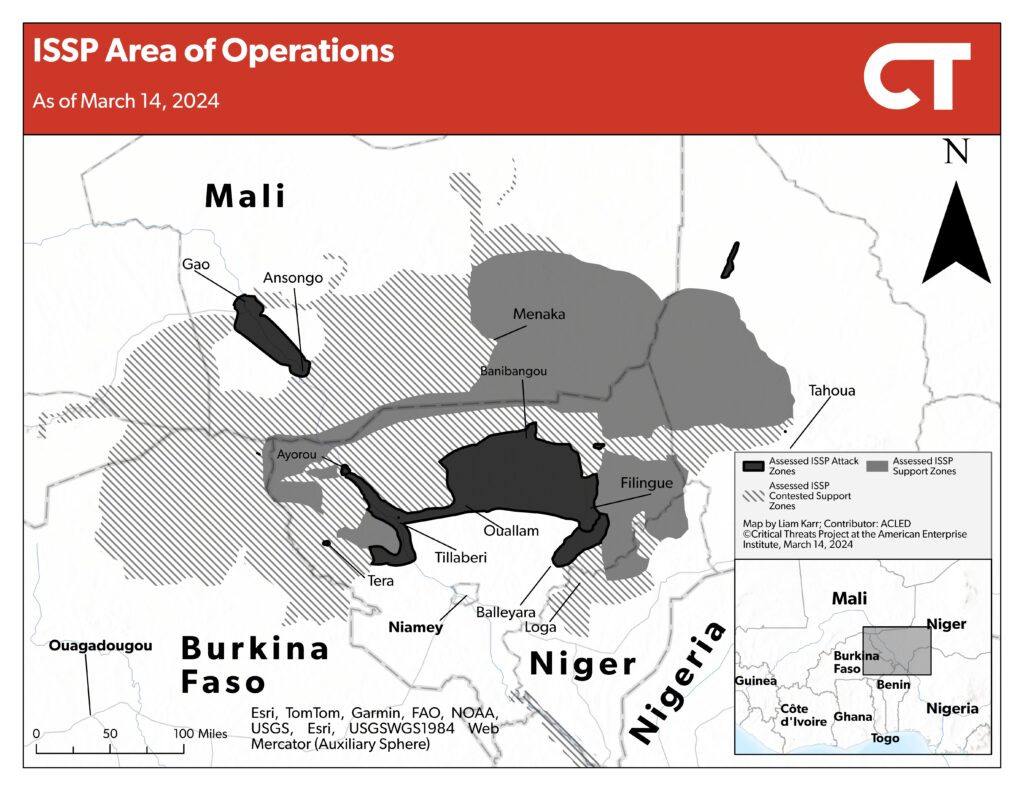
Source: Liam Karr; Armed Conflict Location and Event Database.
The larger areas under ISSP control have become a destination for foreign fighters, increasing the transnational threat the group poses, especially to Europe. UN Security Council reported in August 2023 that IS recruiters and facilitators had established transit corridors between southern Europe and the Sahel.[14] Moroccan security forces have since disrupted three IS cells facilitating foreign fighters’ travel to ISSP in Mali in October 2023 and January–February 2024.[15] Swedish police also warned on March 8 that they had seen an increased interest in radicalized individuals attempting to travel to Africa to join IS affiliates.[16]
The presence of foreign fighters previously led to an increase in Salafi-jihadi groups’ external attack plots.[17] Foreign fighters are more hardened ideologues that ascribe to transnational Salafi-jihadism and are not as interested in the local aims or grievances that motivate local militants. Many foreign fighters have also demonstrated an interest in returning to their countries of origin to organize attack plots after being further radicalized in an active conflict theater.[18] The IS network in northwest Africa has also already shown an interest in organizing external activity, given that the UN Security Council reported that it had organized a now-disrupted attack cell operating out of Morocco and Spain.[19]
JNIM has used the truce to exploit the withdrawal of UN forces from northern Mali and the arrival of the Malian army and Wagner Group mercenaries in northern Mali. UN peacekeepers, which had protected population centers and facilitated a 2015 peace deal between the Malian government and separatist rebels, began drawing down in June 2023 after the Malian junta requested they leave the country. The peacekeepers withdrew from Mali by December 2023.[20] The Malian army and its Wagner Group auxiliaries backfilled the UN peacekeepers, which renewed fighting between security forces and the separatist Tuareg rebels that had de facto controlled northern Mali since the UN-backed 2015 peace agreement.[21] The Malian army and the Wagner Group took control of these major population centers and their attached military bases by the end of 2023.[22]
JNIM has taken advantage of the Malian army and Wagner Group mercenaries’ arrival to boost its local legitimacy among alienated civilians. JNIM has increased the rate and severity of its attacks in northern Mali since the UN troops began withdrawing in June 2023, indicating it has been reallocating resources away from ISSP and toward the evolving situation in northern Mali.[23] The Malian army and Wagner Group forces have spread human rights abuses against civilians in the towns and surrounding areas since entering the area.[24] JNIM exploits these abuses to frame itself as a local protector fighting against abusive security forces and evil foreign mercenaries, boosting its local legitimacy and recruitment numbers as a result.[25]
JNIM has selectively chosen its engagements in northern Mali, likely to sideline and co-opt rebel groups and establish itself as the sole legitimate actor in the region. CTP previously assessed that JNIM would benefit from the resumption of hostilities in the north due to the group’s strong ties with separatist rebels and their communities, which would need JNIM support to resist security forces.[26] These ties have not translated to a blank check of support from JNIM to the rebels, however. The separatist rebels bloodlessly abandoned symbolic strongholds that they had held for over a decade to Malian and Wagner forces, indicating that JNIM did not support the rebels to hold these population centers despite possible coordination on smaller-scale attacks.[27]
The rebels’ losses undermine their legitimacy as an effective resistance to the Malian government. JNIM’s emir attempted to co-opt the rebels’ legitimacy by framing fighting as a religious struggle, not a battle for “decentralization” or equality between northern and southern Mali.[28] Al Qaeda affiliates successfully co-opted the Tuareg separatist cause in 2012 and channeled that momentum into taking over most of northern Mali before the French military intervention undid these gains.[29] At least one rebel commander and a group of rebel fighters defected to JNIM for unspecified reasons on March 8, 2024, underscoring the risk that JNIM will repeat this phenomenon.[30]
ISSP and JNIM recently fought in northeastern Mali for the first time since December 2023. This clash could signal an end to the informal détente and draw resources away from both groups’ other campaigns in adjacent areas of Burkina Faso, Mali, and Niger and toward each other. ISSP attacked JNIM militants in northern Mali on March 8 and 9.[31] One of the attacks killed a local JNIM commander, increasing the chances of retaliation and escalation.[32]
Figure 3. ISSP and JNIM Contest the Tri-Border Region
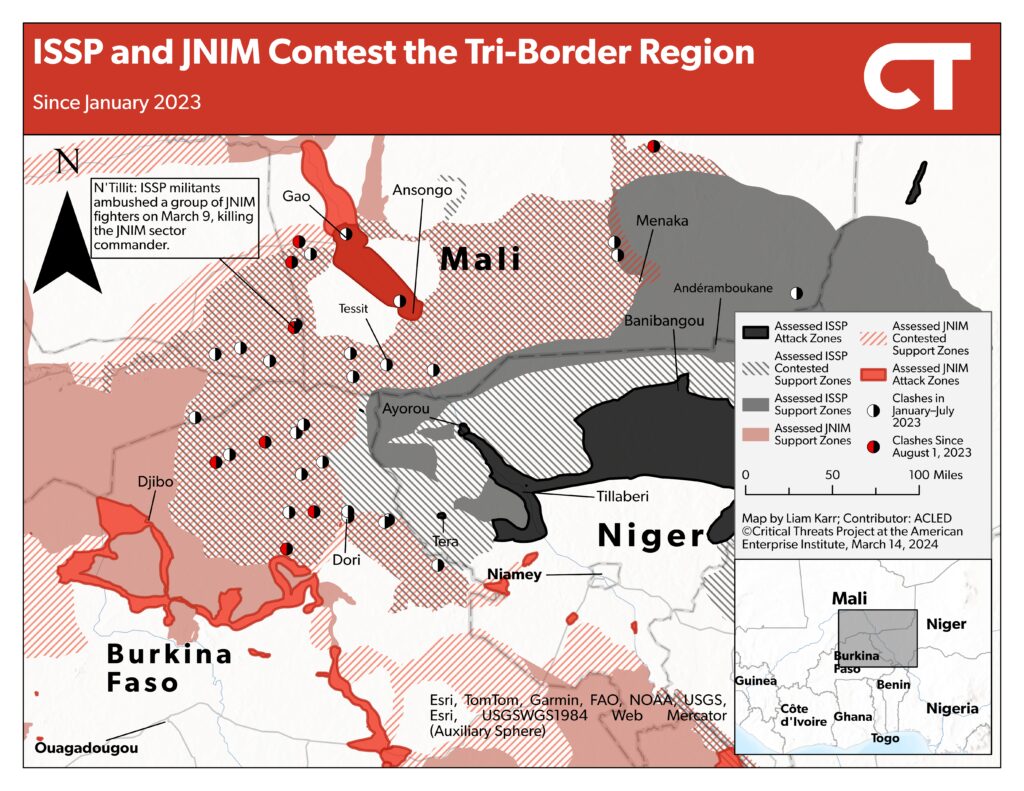
Source: Liam Karr; Armed Conflict Location and Event Database.
The killed JNIM commander operated closer to central Mali and the Burkinabe and Nigerien borders, however, which could contain resumed fighting in this area and allow a more localized truce in northeastern Mali to continue. ISSP and JNIM fighters operating around the central Mali–Burkina Faso border and in Burkina Faso also experienced a clear decrease in the rate of engagements and fatalities, but overall violence in this area notably stayed at a higher level than in northeastern Mali. Engagements declined from 12 instances in the first seven months of 2023 to five instances since August, and fatalities decreased even more sharply over the same periods, dropping from 135 to 19.[33]
Different JNIM subgroups operate in central Mali and Burkina Faso than in northern Mali.[34] The subgroups in central Mali and Burkina Faso have more ethnic Fulani militants, similar to ISSP, whereas the JNIM fighters in northern Mali are predominantly Tuareg or Arab.[35] This ethnic overlap in central Mali and Burkina Faso means that ISSP and the JNIM subgroups in the area are directly competing for popular support and cannot as easily appeal to interethnic grievances, adding a different dimension to the inter-jihadi rivalry in this area.[36]
Figure 4. Inter-Jihadi Clashes in Central Mali and Burkina Faso, 2023–24
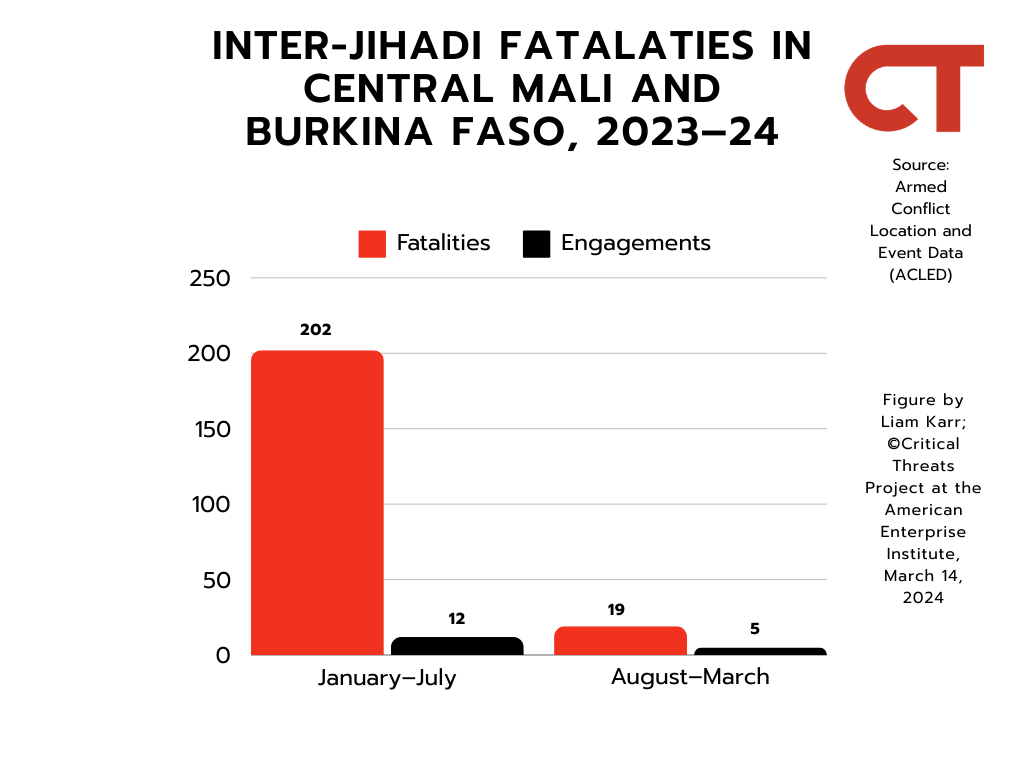
Source: Liam Karr; Armed Conflict Location and Event Database.
Somalia
Somali troops and local militia abandoned several recently liberated towns in central Somalia’s Mudug region on March 11, which enabled al Shabaab to recapture these areas. Somali forces withdrew from Ba’adweyne, ’Aad, and ’Amara towns (also spelled Bacadweyne, Caad, and Camara) between March 9 and 11.[37] Somali media have given several reasons for the withdrawals, including lack of salary payments and rotations, bribes, and political infighting.[38] Somali troops withdrew from a fourth town, Hinlabi (alternatively spelled as Xinlabi), on March 14.[39]
This rapid and sudden backsliding reversed the only major counterterrorism efforts the SFG made in central Somalia in the first quarter of 2024. Somali forces that secured the towns in September 2023 had cleared entrenched al Shabaab resistance in nearby rural areas with the help of US air support in January and February 2024, which Somali officials said resulted in hundreds of al Shabaab casualties.[40]
Al Shabaab could take advantage of the gaps to threaten Somali forces holding Harardhere, a major port and district capital that Somali forces captured for the first time in over a decade in January 2023.[41] Al Shabaab has used hinterland support zones to stage large-scale attacks involving hundreds of fighters and suicide vehicle-borne improvised explosive devices that overran Somali bases further south in southern Somalia.[42] The group’s capture of towns near Harardhere provides such staging grounds and improves resource access. Harardhere’s capture has been one of the major achievements of the central Somalia counteroffensive campaign that began in 2022, as it was one of two district capitals that Somali forces captured that were previously governed by al Shabaab.
Figure 5. Somali Forces Withdraw from Key Towns in Central Somalia
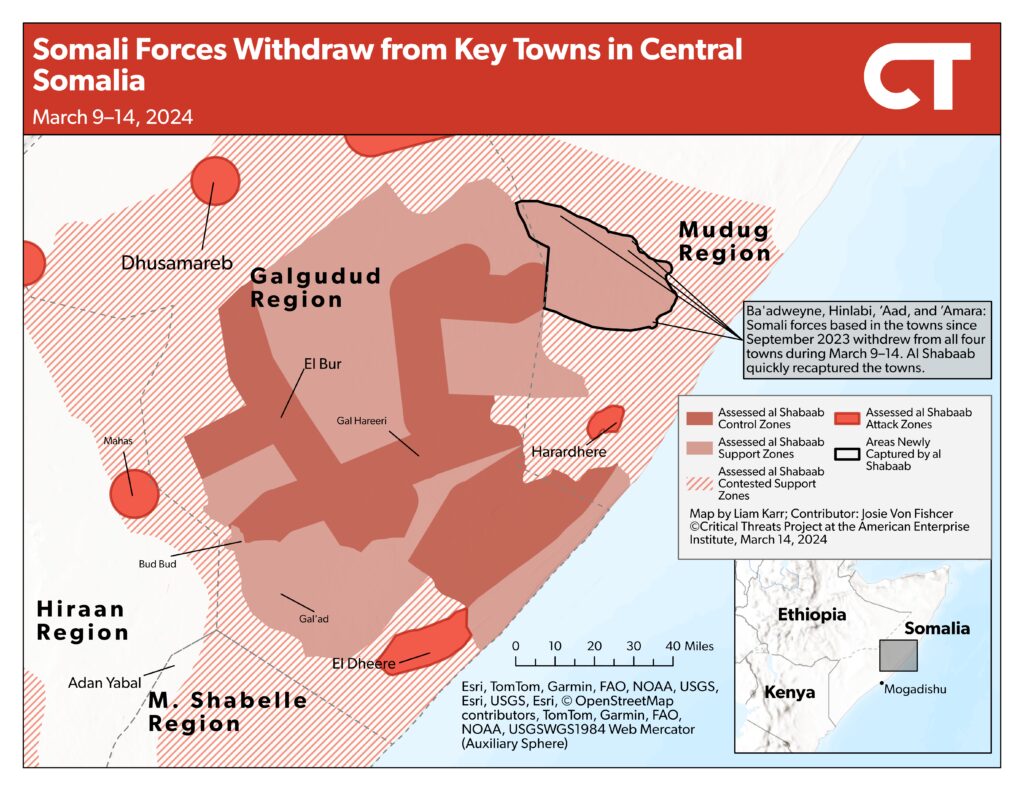
Source: Liam Karr.
The UAE suspended the salary payments for several Somali National Army units in Mogadishu, likely due to a recent al Shabaab attack.[43] Emirati military personnel in Somalia are helping train thousands of Somali soldiers to combat al Shabaab. The Emirati training is part of a military cooperation agreement between Somalia and the UAE that began in 2014 and expanded in 2022 after a multiyear pause.[44] The training program is a major part of the SFG plans to strengthen Somali security forces before the scheduled withdrawal of African Union troops at the end of 2024.[45] At least two Emirati-trained Somali battalions deployed in Mogadishu have helped improve security in the capital throughout 2023, decreasing overall al Shabaab attacks and fatalities compared to 2022.[46]
Somali media reported that the suspension of payments is the beginning of cuts to Emirati support for the Somali National Army.[47] The death of four Emirati trainers in an al Shabaab attack at a UAE-run military base in Mogadishu on February 10 may have prompted the UAE to scale back support.[48] Domestic casualty aversion has contributed to the UAE’s withdrawal from closer and more strategically critical theaters, such as Yemen in 2019.[49]
Somalia’s growing ties with Turkey are also undermining the UAE’s geopolitical position in Somalia and decreasing its incentives to stay in the country. Turkey and Somalia signed a bilateral maritime agreement in February that authorized Turkey to build, train, and equip the Somali navy and deploy ships to combat illegal activity and remove “any external violations or threats” to Somalia’s coast.[50] In exchange, Turkey received economic stakes in development projects in the Somali exclusive economic zone.[51]
The agreement strengthens Turkey’s position in critical waterways off the Somali coast at the expense of the UAE. The SFG was considering a similar deal with the UAE for over a year before signing the 2024 deal with Turkey.[52] The UAE has pursued other efforts to increase its influence in these waters, such as supporting Ethiopia’s ambitions to gain Gulf of Aden port access, which would establish another pro-Emirati client port. The UAE’s previous support for an Ethiopian stake in the Emirati port in Somaliland 2018 and its ties to the Ethiopian government have led multiple media outlets and CTP to assess that it at least tacitly supports Ethiopia’s 2024 port deal with Somaliland, a de facto independent breakaway region of Somalia.[53] CTP previously assessed that the Somalia-Turkey agreement partially aims to deter the Ethiopia-Somaliland port deal, making the development a double blow to the UAE.[54]

